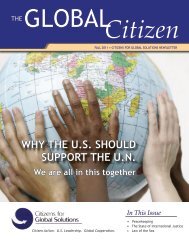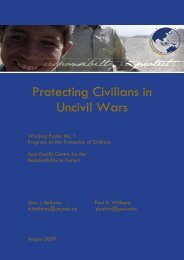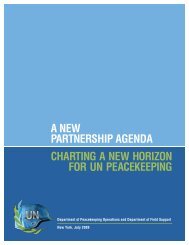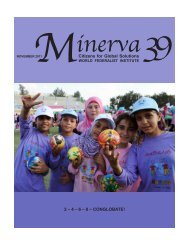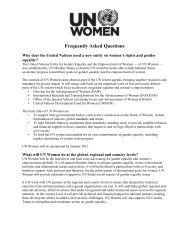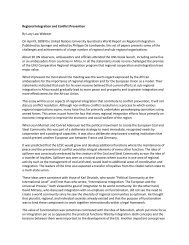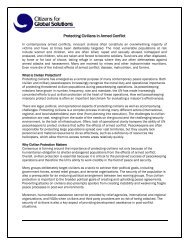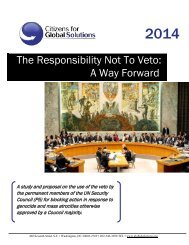Minerva, Spring 2008 (Volume 32) - Citizens for Global Solutions
Minerva, Spring 2008 (Volume 32) - Citizens for Global Solutions
Minerva, Spring 2008 (Volume 32) - Citizens for Global Solutions
You also want an ePaper? Increase the reach of your titles
YUMPU automatically turns print PDFs into web optimized ePapers that Google loves.
Overcoming Wars and Empire<br />
by Incentivizing Justice and Democracy<br />
Lucy Law Webster<br />
Lucy Law Webster is Vice Chair of the<br />
Council of the World Federalist<br />
Movement and Secretary & UN Representative<br />
of Economists <strong>for</strong> Peace and<br />
Security. She is also Executive Director<br />
of the Center <strong>for</strong> War/Peace Studies.<br />
Previously, she worked in the United<br />
Nations Secretariat as a Political Affairs<br />
Officer in the Department <strong>for</strong> Disarmament<br />
Affairs, and, be<strong>for</strong>e that, as Special<br />
Assistant to the Secretary General of the<br />
Second World Conference to Combat<br />
Racism, and on other human rights<br />
issues. She also worked <strong>for</strong> UNICEF,<br />
UNDP, UNEP, and on the staff of<br />
Economists <strong>for</strong> Peace and Security on<br />
issues relating to the costs of war<br />
and excessive militarization.<br />
Her work, as outlined at , is based on the conviction that “the<br />
people of the twenty-first century will<br />
require longer, wider vistas to flourish<br />
or even just survive. Each person will<br />
need to see and to respect the hopes and<br />
fears of all within their communities in<br />
villages and cities and in networks across<br />
the whole wide earth. They will need to<br />
work <strong>for</strong> each other and <strong>for</strong> the common<br />
norms of world law and human rights.”<br />
This essay, reprinted with permission of<br />
the author, first appeared in Arms, War,<br />
and Terrorism in the <strong>Global</strong> Economy Today,<br />
Economic Analyses and Civilian Alternatives,<br />
Wolfram Elsner (Ed.) Bremer<br />
Schriften zur Konversion, p265–272 (Lit<br />
Verlag D. W. Hopf Hamburg 2007).<br />
The international interventions of the past decade in Kosovo, East Timor, Afghanistan<br />
and Iraq have posed peace and law and human rights in strange <strong>for</strong>ms of tension against<br />
each other. In fact international humanitarian law and peace are congruent, but the only<br />
<strong>for</strong>ms of international intervention that would be legitimate have not as yet been tried.<br />
This relates to the lack of creative evolutionary approaches to social science and policy.<br />
The essay shows the limited legitimacy of recent interventions, explains why such nonhumanitarian<br />
actions are no longer appropriate and how international law and civic<br />
action can be used to build peace and to trans<strong>for</strong>m the power that tends to encourage<br />
empire and imperialism into power <strong>for</strong> democracy.<br />
A Critique of Collective Security as Envisioned in the United Nations System<br />
Collective security as envisioned when the UN Charter was written was intended to<br />
allow strong states to protect weak states whenever there would be aggression by one<br />
against the other. But there have been relatively few acts of invasion across neighboring<br />
borders; the Iraqi invasion of Kuwait that was reversed by the Persian Gulf War was an<br />
exception. Most wars occur within states as civil wars between factions or insurgents<br />
against incumbents. This fact is based on economic power relationships that deserve<br />
more attention from economists and more action to create incentives <strong>for</strong> peace to replace<br />
the historic incentives <strong>for</strong> war. Almost any international intervention whether fully<br />
endorsed or just barely tolerated by the UN Security Council leads to power gains and<br />
losses within the country in conflict and internationally and results in some measure of<br />
outside control and imperialism even when the motive is humanitarian. It is sometimes<br />
said that collective security is what the P5 permanent members of the Security Council<br />
do to poor nations. And now we have seen the invasion of Afghanistan and Iraq led by<br />
the world’s only superpower. The fact that the first of these wars is deemed legal (the<br />
United States was attacked by people based in Afghanistan) and the second is much less<br />
widely viewed as legal obscures the main issues. Both wars can be seen as callous acts<br />
of empire by the people attacked, and consequently there is no effective demonstration<br />
of the value of avoiding the types of behavior that led to these wars. Instead of reducing<br />
terrorism, more people have seen reasons to become terrorists to resist what they<br />
perceive as the hand of empire.<br />
Collective security involves collective punishment; whole nations suffer <strong>for</strong> the actions<br />
of their leaders. Often, as in the Gulf War of 1990/1991, the leaders do not suffer at all;<br />
in which case there is no disincentive to start other wars, whether wars against weaker<br />
segments within a state, or wars to liberate or protect the weak. The use of military <strong>for</strong>ce,<br />
even when endorsed by Security Council mandate, requires the violent imposition of<br />
order as defined by and administered by global powers whether they are sensitive to the<br />
local and regional culture or not.<br />
The Need to Replace Military <strong>Global</strong>ism with the Democratic Rule of Law<br />
Such military globalism feels like imperialism to the people whose lives and homes<br />
and cultures are attacked and it looks like imperialism to millions of people worldwide<br />
who value human rights and cultural autonomy. The historical evidence indicates that<br />
norms of humanitarian law and democracy can be built up within a region, and even<br />
create a magnet <strong>for</strong> imitation as has happened in the European Union. However there<br />
is no evidence that such norms can be imposed from the outside unless there are strong<br />
indigenous roots that an outside <strong>for</strong>ce can then endorse. Whoever would impose de-<br />
9 • <strong>Minerva</strong> #<strong>32</strong> • June <strong>2008</strong>



